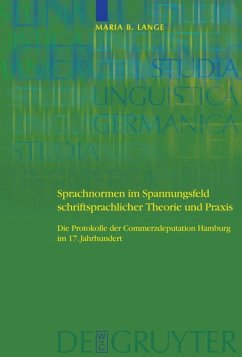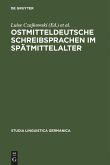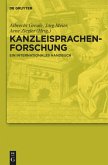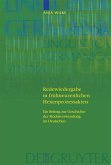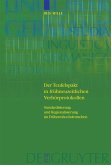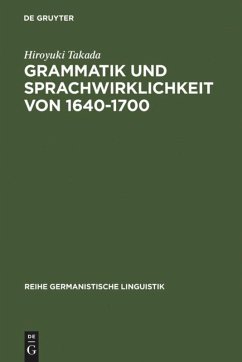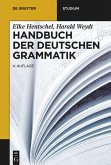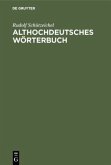The study examines the influence of 17th century grammarians on the standardisation of the German written language. It is based on a corpus of handwritten records and on the theoretical writings of leading grammarians. Traditionally, it has been assumed that the grammarians were the dominant factor in the formation of the German written language, but this is called into doubt by the comparison of theory and practice.
Using the Hamburg merchant class, the analysis of the textual records themselves provides a graphic example of how applied scriptorality can be deployed as an instrument of power and illuminates the working conditions for city chancery clerks.
Die Arbeit untersucht den Einfluss der Grammatiker des siebzehnten Jahrhunderts auf die Ausbildung einer Norm der deutschen Schriftsprache. Orthographische, morphologische und syntaktische Merkmale aus einem Korpus handschriftlicher Protokolltexte werden mit den metalinguistischen Aussagen in zeitgenössischen sprachtheoretischen Arbeiten verglichen. Als bedeutendster Grammatiker steht dabei J. G. Schottelius im Vordergrund. Besondere Bedeutung wird auch den Briefstellern G. Ph. Harsdörffers und K. Stielers eingeräumt, da bei diesen ein direkter Einfluss auf die Schreibpraxis zu vermuten ist. Die Bedeutung der Grammatiker als dominanter Faktor bei der Ausbildung der deutschen Schriftsprache wird nach einem Vergleich von Theorie und Praxis in Frage gestellt.
Aufgewertet wird andererseits die Bedeutung der kanzleisprachlichen Schrifttradition. Die Untersuchung des soziolinguistischen Hintergrundes der analysierten Protokolltexte liefert wertvolle Hinweise zum Fortbestehen dieser weithin für das siebzehnte Jahrhundert totgesagten Kanzleitradition. Zusätzlich werden die Arbeitsbedingungen städtischer Kanzlisten beleuchtet, insbesondere ihre Qualifikation und ihr Status, die in der Praxis nicht ohne Auswirkungen auf die Sprachwahl blieben. Die pragmatische Untersuchung der Protokolltexte selbst liefert anhand der Hamburger Kaufmannschaft ein anschauliches Beispiel für den gezielten Einsatz geltungshoher und -weiter Sprache als Machtinstrument.
Using the Hamburg merchant class, the analysis of the textual records themselves provides a graphic example of how applied scriptorality can be deployed as an instrument of power and illuminates the working conditions for city chancery clerks.
Die Arbeit untersucht den Einfluss der Grammatiker des siebzehnten Jahrhunderts auf die Ausbildung einer Norm der deutschen Schriftsprache. Orthographische, morphologische und syntaktische Merkmale aus einem Korpus handschriftlicher Protokolltexte werden mit den metalinguistischen Aussagen in zeitgenössischen sprachtheoretischen Arbeiten verglichen. Als bedeutendster Grammatiker steht dabei J. G. Schottelius im Vordergrund. Besondere Bedeutung wird auch den Briefstellern G. Ph. Harsdörffers und K. Stielers eingeräumt, da bei diesen ein direkter Einfluss auf die Schreibpraxis zu vermuten ist. Die Bedeutung der Grammatiker als dominanter Faktor bei der Ausbildung der deutschen Schriftsprache wird nach einem Vergleich von Theorie und Praxis in Frage gestellt.
Aufgewertet wird andererseits die Bedeutung der kanzleisprachlichen Schrifttradition. Die Untersuchung des soziolinguistischen Hintergrundes der analysierten Protokolltexte liefert wertvolle Hinweise zum Fortbestehen dieser weithin für das siebzehnte Jahrhundert totgesagten Kanzleitradition. Zusätzlich werden die Arbeitsbedingungen städtischer Kanzlisten beleuchtet, insbesondere ihre Qualifikation und ihr Status, die in der Praxis nicht ohne Auswirkungen auf die Sprachwahl blieben. Die pragmatische Untersuchung der Protokolltexte selbst liefert anhand der Hamburger Kaufmannschaft ein anschauliches Beispiel für den gezielten Einsatz geltungshoher und -weiter Sprache als Machtinstrument.

